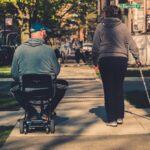Chronic illness comes in many forms. It has countless impacts on the sufferer and on those close to them. I think of friends whose six-year-old was recently diagnosed with type 1 diabetes. It was initially a terrifying trip to hospital; then a practical phase of diagnosis and education; and then reality slowly set in that this is never going away. Every meal must be accounted for, insulin jabs must be regularly administered. This was the background anxiety they must learn to live with.
I think of another friend who has had chronic ulcerative colitis for the last seven years. He can function to some degree but often has stints in hospital and is almost always living with diarrhoea and the fatigue and dehydration that goes along with that. Then throw two energetic sons into the mix. As you can imagine, daily life is hard. This is not the blissful picture of family life he and his wife might have looked forward to on their wedding day!
For me, chronic illness has come in the form of daily vestibular migraines for the last four years. Vestibular means that a common symptom of my migraines is dizziness or vertigo. I also experience more typical migraine symptoms such as headaches; head pressure; neck, back and arm pain; visual blurriness; brain fog; fatigue; light and noise sensitivity; as well as a few other random symptoms and medication side effects that I won’t bore you with. The severity of my migraines varies, but I can count on one hand the number of symptom-free days I’ve had in the last four years. My main triggers are noise, movement, stress and hormonal fluctuations—not easy things to avoid out in the world, in my house, or in my body!
A Difficult Lot in Life
This has been an incredibly challenging season for me and for our family, but it’s a walk in the park compared to others I know who’ve suffered for decades with chronic pain, chronic fatigue, anxiety, depression, MS, relapsing cancer—I could go on. Regardless of the length or severity of your suffering, long-term, ever-present illness is not an easy lot in life. On top of the effects of the illness itself, it is often invisible, hard to explain, and misunderstood.
Yet God promises not only to be our help in suffering (for e.g. Ps 32:7, Ps 46, Rom 8:26), but to use it for our good (for e.g. Rom 5:3–4, Rom 8:18–30, Jas 1:2–4). My learning has been imperfect, and I have proved myself to be a deeply flawed, sinful human being throughout, but God has been faithful and the things he has taught me have been of great worth. I hope they are of encouragement to you as you also suffer, or as you seek to care for someone in your life who suffers.
Some Problems Can’t Be Fixed
In this season, God has been causing me to cling to the hope of heaven. I remember so clearly the first time I thought “This could be it, this could be the rest of my life; maybe this is not going away.” I’d just pulled into the driveway of our pink house in England, where we were living at the time. It was such a depressing thought.
We are accustomed to problems being identified and solved. We expect doctors to give us a pill and after a few days we’re back to normal. When that doesn’t happen, we assume there’s a problem with the doctor. So we go to another. An unsolved health problem just isn’t good enough, we think. For some of us, our experience of life has largely been one of problems being solved. While it may come as a shock, sooner or later, as we live life under the sun, we will discover that some problems can’t be fixed. Some problems don’t just go away. Doctors can do a lot, but they’re not God.
A Hope to Hold on to
My second thought after I turned off the engine was “Imagine if I wasn’t a Christian!”—to live with this being the rest of my life and no hope of a perfected creation to follow. ‘YOLO’ is a big disappointment when you’re in my body. Imagine if all I had was this life, with no hope of being free of mourning and tears and pain! But I get to live in this imperfect body, being reminded daily by its imperfections that one day I will be made new. One day, I have the certain hope of a body that will not get dizzy when I bend to pick up toys, won’t get a headache from going to the shops or to church, and won’t cause me to cancel plans yet again because of a migraine.
Having the reminder, from my broken body, of the hope of heaven doesn’t mean that I don’t seek improvement for my health in this life. But whether or not my health improves, I have something even better waiting for me. This is not all there is. There is something far greater to look forward to. And that helps keep my eyes fixed where they should be: on Jesus.
I may be reminded of it more frequently than most, but we all live in bodies that will fail us. As your mortal flesh groans, let it point you to the new creation. For “our present sufferings are not worth comparing with the glory that will be revealed in us” (Rom 8:18).
Come Lord Jesus!











